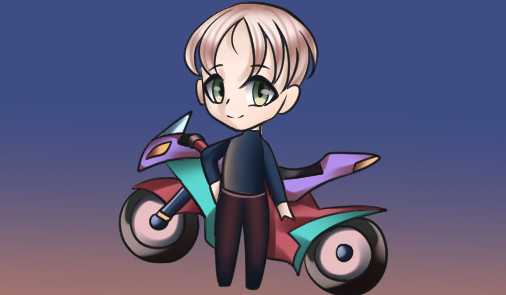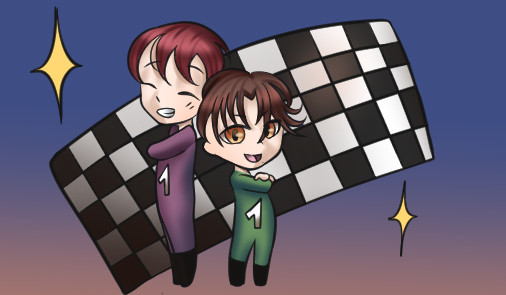Riders
Riders' performance depends mostly on their skills but it is affected also by personality.
Introduction
 Performances on the track of each Rider are determined by
their skills and experience. Experience is very important: the more
experienced riders will go faster and do fewer mistakes, but the real
strength of a rider can be evaluated based on six main skills:
form, concentration, competence, technique, confidence, and braking.
Riders' performance depends mostly on those skills but it is
affected also by their personality.
Performances on the track of each Rider are determined by
their skills and experience. Experience is very important: the more
experienced riders will go faster and do fewer mistakes, but the real
strength of a rider can be evaluated based on six main skills:
form, concentration, competence, technique, confidence, and braking.
Riders' performance depends mostly on those skills but it is
affected also by their personality.
You may have a maximum of ten riders in your wallet, otherwise the game will not start. Move the extras assets to another wallet if that is the case.
Skills
Skills change over time: they can be improved by special training, and the younger drivers improve their skills much faster than older ones. When a rider is approaching 40, his skills may decrease; this process does not occur equally over time: the decrease is very slow for riders around 40, and much faster with increasing age.
Form
Identifies the current state of fitness of the rider. While conducting a regular and prudent life, every athlete needs specific training to gain a better condition. A good state of form will allow the rider to make the best, even (and especially) when fatigue starts to hinder their lesser-trained rivals at the end of the race. Any accident will produce negative effects on the physical condition of a rider, in amounts proportional to the severity. A highly debilitated rider can not in any way drive in the race as it would put a serious risk to his and others’ safety. Under normal conditions, the form of the rider always tends towards "acceptable", the minimum requirement for the next Grand Prix participation, but the time for improvements is closely linked to the rider’s age: a boy will heal faster and expand his fitness in a short time, while older people need long recovery times and tend to lose their shape more quickly if you do not train them consistently.
Concentration
Denotes the capacity of the rider to focus his attention on the race in progress to maximize results. The more a rider is focused on the race, the higher his yield. Riders lacking in this aspect will tend to more mistakes and will be more susceptible to a form of "psychological subjection" against rivals who are more focused when starting a fight and more generally will have trouble expressing their full potential. Riders’ concentration tends to spontaneously vary over time; for example, it will decline as a result of personal problems or physical discomforts that are not mentioned as injuries, or it may increase for reasons that are, in the same way, not related to their athletic activities. However, there are specific circumstances that may lead to changes in concentration: it is mainly affected by participating in official competitions and, to a lesser extent, training. Refraining from running could cause a lower concentration than that of those who go on the track.
Competence
It identifies the rider's knowledge about the various motorcycle components. This allows optimal development so engineers can perform their work at their best. Competence also impacts the rider's ability to exploit the characteristics of his motorcycle: the most competent riders will interpret the acquired driving techniques in a better way, resulting in more effective competition.
Technique
The ability of the rider to take the bike in the best possible way. Simply speaking, this is all that sum of special abilities that allow us to understand how good a rider is, and is undoubtedly of primary importance to improve the technique of a driver through specific training, as this is the only basic requirement to make a difference on the track. This feature allows the rider to get the best of setup, suspension, and power of any motorcycle.
Confidence
The skill of the rider to bring the bike into providing the maximum in the shortest possible time is especially useful in the opening of the race and exiting from each bind, or at the entrance of a straight line. The less skilled riders, in addition to losing precious tenths, will tend to urge poorly on the motorcycle mechanics, producing more pronounced effects on its structure; they may also commit mistakes in the case of overly aggressive driving or under not optimal conditions. This feature allows the rider to use the motorcycle torque at its best.
Braking
The ability of the rider to minimize the braking, while following along the bind in the best possible way. The most skillful riders will exploit their ability to make important overtakes, while the poor ones may lose more time with too large brakings or even follow up far worse consequences. This feature allows the rider to make the best use of the brakes of the motorcycle.
Skill levels
Skills for all the riders are evaluated using human-readable terminology every week, so that you can always have updated information. Keep in mind that those levels don't take in consideration the decimal points: you may not notice updates in their skill levels while the riders actually perform better.
For example, if you started training a rider for a specific skill when it was reported as acceptable and this don't change after several weeks, maybe the real value at the start was something close to 6.0 and now it is at 6.9: it would still be reported as acceptable, while it is way closer to solid. The actual human-readable definition will be updated only when the level reaches 7.0.
- non-existent
- disastrous
- wretched
- poor
- weak
- inadeguate
- passable
- solid
- excellent
- formidable
- outstanding
- brilliant
- magnificent
- world-class
- supernatural
- titanic
- extra-terrestial
- mythical
- magical
- utopian

 Teams
Teams
 Motorcycles
Motorcycles